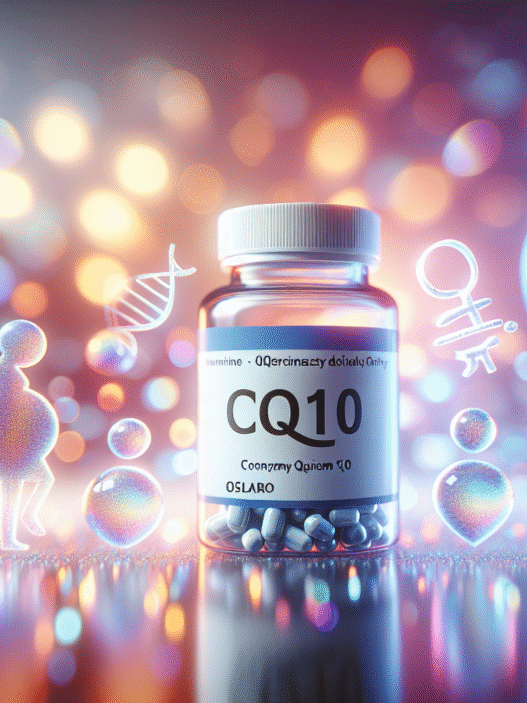CoQ10 and Skin Health
Coenzyme Q10 (CoQ10) is a lipid-soluble molecule renowned for its pivotal role in cellular energy production and antioxidant activity. As an integral component of the skincare regime, especially for those concerned with aging, CoQ10 offers numerous benefits for the skin.
Understanding CoQ10 Benefits
CoQ10 is essential for generating energy within cells and functions as a potent antioxidant, shielding cells from oxidative damage. This enzyme becomes increasingly significant in skincare as individuals age, since natural levels of CoQ10 in cells decline over time. This decline contributes to visible signs of aging such as wrinkles, fine lines, and dullness (City Skin Clinic).
Energy Production and Antioxidant Protection
CoQ10 plays a crucial role in cellular energy production by assisting in the mitochondria. It helps convert nutrients into energy, which is vital for maintaining healthy skin cells. The antioxidant properties of CoQ10 protect the skin from free radicals, which are harmful molecules that accelerate the aging process. Thus, replenishing CoQ10 levels through skincare products can counteract cellular damage and support overall skin health.
Effects on Skin Elasticity and Smoothness
Studies have demonstrated that CoQ10 can significantly enhance skin elasticity and smoothness. Daily supplementation with CoQ10, ranging from 50 to 150 mg for 12 weeks, has been shown to limit seasonal deterioration of viscoelasticity, significantly reduce wrinkles and microrelief lines, and improve skin smoothness (PubMed). However, it did not significantly affect skin hydration and dermis thickness.
| Benefit | CoQ10 Effect |
|---|---|
| Wrinkle Reduction | Significant |
| Skin Smoothness | Improved |
| Elasticity | Enhanced |
| Hydration | No significant effect |
| Dermis Thickness | No significant effect |
Penetration and Repair Processes
CoQ10’s ability to penetrate the skin layers allows it to provide antioxidant protection directly where it’s needed. This factor supports the skin’s natural repair processes by reducing inflammation, preventing cellular senescence, and increasing the expression of collagen and elastin in skin cells. These effects collectively contribute to a more youthful and resilient appearance.
CoQ10 initially gained popularity as a dietary supplement for cardiovascular health. However, it has since become a prominent ingredient in topical anti-aging skincare products, beginning in the 1990s. Today, CoQ10 is found in various forms of skincare items aimed at reducing wrinkles and enhancing skin elasticity (City Skin Clinic).
To learn more about the specific benefits of CoQ10 in skincare, visit our article on coq10 benefits for skin or explore options for coq10 skincare products. For detailed insights on the impact of CoQ10 on skin elasticity, refer to our dedicated page on coq10 and skin elasticity.
Importance of CoQ10
CoQ10 (Coenzyme Q10) is a vital compound present in every cell of the human body. It is essential for energy production and acts as a powerful antioxidant. This dual function makes CoQ10 significant for maintaining healthy skin and combating signs of aging.
Cellular Energy Production
CoQ10 plays a crucial role in cellular energy production. It acts as a cofactor for mitochondrial enzyme pathways, which are essential for producing ATP (adenosine triphosphate) — the primary energy currency of cells. Increased concentrations of CoQ10 in the mitochondria enhance respiration, ensuring that cells, including skin cells, have adequate energy to function optimally (Journal of Clinical and Aesthetic Dermatology).
The skin, as the body’s largest organ, requires substantial energy to maintain its functions, such as regeneration, repair, and barrier protection. As people age, natural levels of CoQ10 in the cells diminish, which can lead to decreased cellular energy production. This reduction in energy can manifest as visible signs of aging, including wrinkles, fine lines, and dull skin. By replenishing CoQ10 levels through topical applications, the skin’s energy production can improve, leading to a more youthful appearance (City Skin Clinic).
Antioxidant Protection
In addition to its role in energy production, CoQ10 is a potent antioxidant. Antioxidants protect cells from oxidative damage caused by free radicals. These free radicals are unstable molecules that can damage cellular structures, including DNA, proteins, and lipids. Over time, this oxidative damage can contribute to the aging process and various skin issues like wrinkles and loss of elasticity (City Skin Clinic).
Scientific studies have demonstrated that CoQ10 application can penetrate the skin layers and provide significant antioxidant protection. By neutralizing free radicals, CoQ10 helps to prevent oxidative damage, supporting the skin’s natural repair processes and contributing to overall skin health. CoQ10 can enhance skin smoothness and reduce the appearance of wrinkles, making it a popular ingredient in anti-aging skincare products.
Clinical data suggest that CoQ10-containing skincare products can improve the antioxidative status, reduce UVA-induced ultra-weak photon emissions, and increase skin moisturization in individuals aged 35 to 60. The improvements in skin roughness and reduction of wrinkles further highlight CoQ10’s role in enhancing skin vitality and aesthetics (Journal of Clinical and Aesthetic Dermatology).
For those interested in skincare, it’s beneficial to explore products containing CoQ10. These products not only support cell energy production but also offer strong antioxidant benefits. Learn more about coq10 skin care products and other related topics like coq10 and skin elasticity on our website.
| Function | Benefits |
|---|---|
| Cellular Energy Production | Enhances cell function, vital for skin regeneration and repair |
| Antioxidant Protection | Protects against oxidative damage, reducing wrinkles and fine lines |
Delving further into the importance of CoQ10 in skin health reveals its essential role in maintaining youthful, radiant skin. Check out more on coq10 benefits for skin and the science of coq10 anti-aging properties for additional insights.
CoQ10 and Visible Aging
Coenzyme Q10 (CoQ10) is a vital molecule in the battle against visible aging. It offers dual benefits by targeting the reduction of wrinkles and enhancing skin smoothness.
Reduction of Wrinkles
CoQ10 has been shown to reduce the appearance of wrinkles by improving the skin’s oxidative status and increasing the expression of collagen and elastin in skin cells. A double-blind, placebo-controlled study with 33 healthy subjects demonstrated that daily supplementation with 50 and 150 mg of CoQ10 for 12 weeks reduced visible signs of aging, such as wrinkles and microrelief lines (PubMed).
In addition to oral supplementation, topical application of CoQ10 has been found to improve antioxidative status and stabilize mitochondrial function against UV irradiation. This leads to reduced wrinkle depth and skin roughness (Journal of Clinical and Aesthetic Dermatology). For more information on how CoQ10 combats wrinkles, explore coq10 and wrinkles.
| Study | Participants | Dosage | Duration | Results |
|---|---|---|---|---|
| Double-blind, placebo-controlled | 33 | 50 – 150 mg | 12 weeks | Reduced wrinkles, improved skin smoothness |
Enhancement of Skin Smoothness
CoQ10 plays a crucial role in enhancing skin smoothness by increasing the proliferation of fibroblasts and promoting collagen production. By improving cellular oxidative status and reducing inflammation, CoQ10 supplementation contributes to a smoother and more youthful complexion.
The same study mentioned earlier also found that CoQ10 supplementation improved skin smoothness by limiting seasonal deterioration of skin viscoelasticity (PubMed). Topical application of CoQ10 resulted in increased skin moisturization, which further contributed to smoother skin. Learn more about the benefits in our article on coq10 benefits for skin and coq10 and skin smoothness.
To maximize the anti-aging benefits of CoQ10, including enhanced skin smoothness, consider choosing coq10 skin care products that support natural repair processes. For additional information on the benefits and proper usage of CoQ10, visit coq10 anti-aging properties.
CoQ10 for Skin Vitality
Exploring the benefits of CoQ10, it’s apparent that this powerful antioxidant plays a significant role in maintaining skin vitality by enhancing skin elasticity and providing protection against damage.
Skin Elasticity Enhancement
CoQ10 has been shown to improve the elasticity of the skin, which is crucial for maintaining a youthful appearance. The application of CoQ10 enhances the expression of collagen and elastin in the skin cells. These proteins are essential for maintaining skin’s structural integrity and flexibility (Journal of Clinical and Aesthetic Dermatology).
Clinical studies have demonstrated that CoQ10 supplementation leads to an improvement in cellular oxidative status and a reduction in wrinkle depth and skin roughness. These changes contribute to enhanced skin firmness and elasticity.
Significant improvements in skin elasticity have been observed after the use of CoQ10-based skincare products for just a few weeks. Data from clinical trials show that facial roughness and wrinkles decreased notably, while skin elasticity improved.
| Study Duration | Improvement | Effect on Skin Elasticity |
|---|---|---|
| 4 weeks | Significant | Enhanced elasticity and reduced wrinkles (Journal of Clinical and Aesthetic Dermatology) |
Protection Against Damage
CoQ10 also offers vital protection against various forms of skin damage. As an antioxidant, CoQ10 helps to neutralize free radicals, reducing oxidative stress on skin cells. This action prevents cellular senescence and inflammation, key contributors to aging skin.
CoQ10 plays a crucial role in protecting and stabilizing mitochondrial function against UV irradiation. By increasing the production of ATP, CoQ10 helps improve cellular respiration. This process is vital for defending skin cells from damage and preventing them from switching to less efficient anaerobic energy production.
Additionally, topical application of CoQ10 demonstrated increased fibroblast proliferation. This leads to better skin repair and regeneration, contributing to overall improved skin health.
For more information about CoQ10 benefits, including its effects on wrinkles and natural sources, visit our articles on coq10 benefits for skin and natural sources of coq10.
By understanding how CoQ10 enhances skin elasticity and protects against damage, individuals can effectively incorporate coq10 skin care products into their routine for better skin vitality and a more youthful appearance.
Applying CoQ10 in Skincare
Penetration into Skin Layers
CoQ10, or coenzyme Q10, has garnered significant attention for its ability to penetrate the skin layers. Initially recognized for its role in cardiovascular health, it made its debut as a topical anti-aging ingredient in the 1990s (City Skin Clinic). Scientific studies have demonstrated that CoQ10 penetrates both the stratum corneum (the skin surface) and deeper skin levels, which is crucial for providing antioxidant protection and supporting the skin’s natural repair processes.
To appreciate the benefits of CoQ10 in skincare, it’s essential to understand its action. CoQ10 acts as a cofactor for mitochondrial enzyme pathways within skin cells, boosting cellular respiration and ATP production. This increased cellular energy helps prevent the skin from converting to less efficient anaerobic energy production, defending against cellular-level skin damage. For more on how this impacts skin elasticity, see our detailed article.
Supporting Natural Repair Processes
CoQ10 plays a vital role in supporting the skin’s natural repair processes. Its antioxidative properties are crucial in combatting oxidative stress and free radicals, which can accelerate skin aging. By bolstering the skin’s antioxidative status, CoQ10 helps to protect and stabilize mitochondrial function against UV radiation and other environmental stressors.
The inclusion of CoQ10 in skincare formulations has shown visible improvements in skin firmness, moisturization, and elasticity. This is because CoQ10 aids the proliferation of fibroblasts, cells responsible for collagen production and skin repair. Studies have demonstrated that CoQ10 supplementation can reduce the depth of cutaneous wrinkles, increase skin roughness, and enhance skin smoothness (Journal of Clinical and Aesthetic Dermatology).
| Benefit | Mechanism |
|---|---|
| Wrinkle Reduction | Increases collagen production and fibroblast proliferation |
| Increased Elasticity | Enhances cellular energy and supports collagen synthesis |
| Antioxidant Protection | Neutralizes free radicals and oxidative stress |
| Improved Moisturization | Enhances skin hydration and barrier function |
For those seeking to incorporate CoQ10 into their skincare routine, it is essential to choose products specifically formulated for their skin type. It’s also beneficial to pair CoQ10 application with other rejuvenating and hydrating ingredients. More information on this topic can be found in our article on coq10 for skin repair.
By understanding how CoQ10 works at a cellular level, one can better appreciate its significant role in anti-aging and maintaining youthful skin. For those looking to delve deeper into CoQ10’s antioxidant benefits, be sure to read about its role in antioxidant protection.
Safe Usage of CoQ10
Skin Types Compatibility
CoQ10, also known as coenzyme Q10, is generally well-tolerated and suitable for all skin types, including sensitive skin (City Skin Clinic). It is particularly beneficial for adults aged 35–65 who are concerned with aging and vitality. CoQ10 helps to restore the skin’s natural energy and resilience against environmental stress. This makes it useful for individuals looking to maintain vibrant and youthful skin coq10-for-youthful-skin.
| Skin Type | Suitability |
|---|---|
| Normal | Suitable |
| Dry | Suitable |
| Oily | Suitable |
| Combination | Suitable |
| Sensitive | Suitable (with caution) |
CoQ10 is beneficial for preventing and addressing signs of aging, such as reduced skin elasticity and the appearance of wrinkles. For more information on how CoQ10 helps with skin elasticity, visit coq10 and skin elasticity.
Potential Skin Irritation
While CoQ10 is generally safe, mild skin irritation is possible, especially for sensitive skin or with high concentrations of CoQ10 (City Skin Clinic). Common signs of irritation include redness, itching, and mild inflammation. It’s crucial to perform a patch test before incorporating CoQ10 products into your routine.
Individuals who are pregnant, breastfeeding, taking blood-thinning medications, or have underlying skin conditions should consult healthcare providers before using CoQ10 in skincare. For further guidance on skin compatibility, refer to coq10 skin care products.
| Risk Factor | Potential Issue | Recommendation |
|---|---|---|
| Sensitive Skin | Mild irritation | Patch test |
| High Concentration | Increased irritation risk | Use lower concentration |
| Pregnancy/Breastfeeding | Precaution needed | Consult healthcare provider |
| Blood-thinning Medications | Potential interaction | Medical consultation |
| Skin Conditions | Possible adverse effects | Doctor’s advice |
CoQ10 is a valuable addition to anti-aging skincare routines due to its antioxidant properties and ability to energize skin cells (City Skin Clinic). Discover the ways CoQ10 aids in protecting against damage at coq10 and skin aging and explore its broader benefits for skin health at coq10 benefits for skin.





















